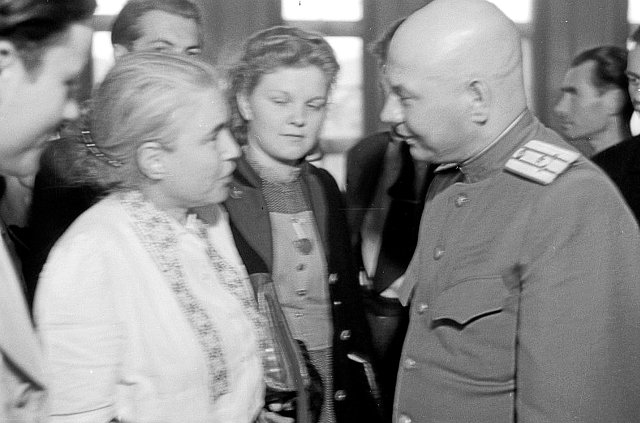The Soviet cultural officer Sergei Tulpanov with the writer Anna Seghers, Pentecost 1947.
Photo: Archive
The bon mot about the dents on the helmets of the comrades is probably familiar, some of them, as the punchline goes, from the class enemy. I was reminded of this when I read Tulpanov’s biography, which – announced years ago – is finally available in print. The former cultural officer of the Soviet Military Administration in Germany (SMAD) Sergei Ivanovich Tulpanov was a military and economist. He tried to build bridges of understanding between Russians and Germans, who had been fighting each other for four years. Tulpanov convincingly demonstrated that this is possible. In this respect, the book by Inge and Michael Pardon comes at the right time, even if it is clear that the rampant Russian hatred in this country is unlikely to be contained.
Tulpanov was one of the defenders of besieged Leningrad, then Marshal Georgi Zhukov brought him to the Stalingrad Front. As a colonel, Tulpanov fought his way through the Ukraine and the Carpathians; on May 8, 1945, his unit was in front of Prague. A quarter of a year later, he took over the information administration of the SMAD (which had originally been called the Propaganda Administration) on behalf of Zhukov.
On the one hand, this department was intended to help reorganize life in Germany and, on the other hand, to convey a different image of the Russians than the Nazis had painted for years. The caricature of the supposedly Slavic subhumans and other “non-Aryan” peoples was ultimately the prerequisite for war being waged against them. And when this war of annihilation and conquest ended with unconditional surrender, the vanquished – very few of whom felt liberated from Nazi rule – feared the revenge of the victors, especially the Russians. After all, they knew what had been done to them. Zhukov is said to have said at the time: “We freed the Germans from fascism, they will never forgive us for that.”
However, the message from Tulpanov and his comrades-in-arms was: We will not starve you and destroy you through work, as you did to us. We will not systematically destroy your villages and towns as you did ours, nor will we lay waste your fields and burn down your barns. We will not gaslight you and put you in camps like you did. We will not let your soldiers die of hunger like you did to Russian prisoners of war. We will not repay you in kind for the lack of culture with which you have confronted us, but will respond to it with culture
Among the one million Leningrad blockade deaths was Tulpanov’s five-year-old daughter Dolores. In Stalingrad, a piece of shrapnel had torn his back open and another German instrument of murder had crippled his right hand. And now he handed it to the Germans. For understanding and reconciliation.
nd.Kompakt – our daily newsletter

Our daily newsletter nd.Compact brings order to the news madness. Every day you will receive an overview of the most exciting stories from the world editorial staff. Get your free subscription here.
There was hardly a Russian family that was not affected by the inhumanity of the German terrorist state. Every Soviet soldier would have had ample reasons to take revenge for the atrocities inflicted on his people. There were some, certainly, who did this. But they were not only called to order, the consequences for their attacks were sometimes no less brutal than war.
Soviet cultural officers like Tulpanov (“a kind Russian heart,” Boleslav Barlog) were often more sensitive and empathetic than their leadership. In May 1947, the German Cultural Association, at whose cradle Tulpanow had stood, held its first federal conference. President Johannes R. Becher, who returned from Soviet exile, gave a speech that was subsequently published in an 80-page brochure. It was confiscated. The accusation from above was that it was a commitment to nationalism. Becher’s speech was entitled “We, the people of the Germans.” Tulpanov struggled to explain that the national sentiment of Johannes R. Becher and other German anti-fascists had nothing to do with the nationalism of the bourgeoisie.
The Soviet officer also campaigned for the release of Gustaf Gründgens, who was picked up by the NKVD because he had been general director of the Prussian State Theater. The actor may have succumbed to the blandishments of the Nazis, but he had also saved the lives of communist colleagues such as Ernst Busch. Tulpanov intervened. Gründgens was released and worked again at the Deutsches Theater as an actor and director.
Or at the end of July 1946: Before Gerhart Hauptmann’s body was brought to Hiddensee, Tulpanow irritated his superiors with his funeral speech in Stralsund. He warned against throwing the baby out with the bathwater when it comes to denazification and democratization: The Nobel Prize winner for literature Hauptmann, author of “Weber,” belongs “to the artistic wealth of all peoples and thus also to the progressive part of the German people.”
Tulpanov was familiar with the psyche of the Germans, but not with intrigues within his own ranks. In addition to his SMAD function, the cultivated colonel also had one in the party – he was the secretary of all CPSU members in the occupying troops. Quite a few party leaders in Moscow were suspicious of his confident thinking and self-confident actions. They repeatedly sent control commissions after him; Since 1946 there have been calls for his replacement with absurd accusations and fabricated accusations.
In the summer of 1949, Tulpanov was first placed under house arrest and then actually deposed. The Central Committee secretary responsible for cadre policy, Kuznetsov (who himself was to be shot in 1950), justified Tulpanov’s dismissal on the basis of his independence. He decides “extremely boldly” on general political questions like “a leader,” which is not his place. (In the background, the fact that Tulpanov’s mother was executed in 1940 as an alleged “spy” and his father died in a camp in Kazakhstan also played a role.)
Tulpanov returned to science. He was not allowed to travel to the GDR for a long time. And when Erich Honecker suggested honoring him with the Karl Marx Order on his 70th birthday in 1971, an order came from Moscow that the GDR should first consider deserving politicians from the leadership of the Soviet Union. However, the high regard among many nameless East Germans for this intelligent bridge builder remained unbroken. Quite a few agreed with Professor Viktor Semyonovich Torkanovsky, his academic friend: “If such a clever, honest man like Tulpanov had stood at the head of the Soviet state, our own and the world’s history would have been different.”
Inge and Michael Pardon: Tulpanow. Stalin’s creators and opponents. With a foreword by Moritz Mebel. Edition Ost, 256 pages, hardcover, €28.
Subscribe to the “nd”
Being left is complicated.
We keep track!
With our digital promotional subscription you can read all issues of »nd« digitally (nd.App or nd.Epaper) for little money at home or on the go.
Subscribe now!
